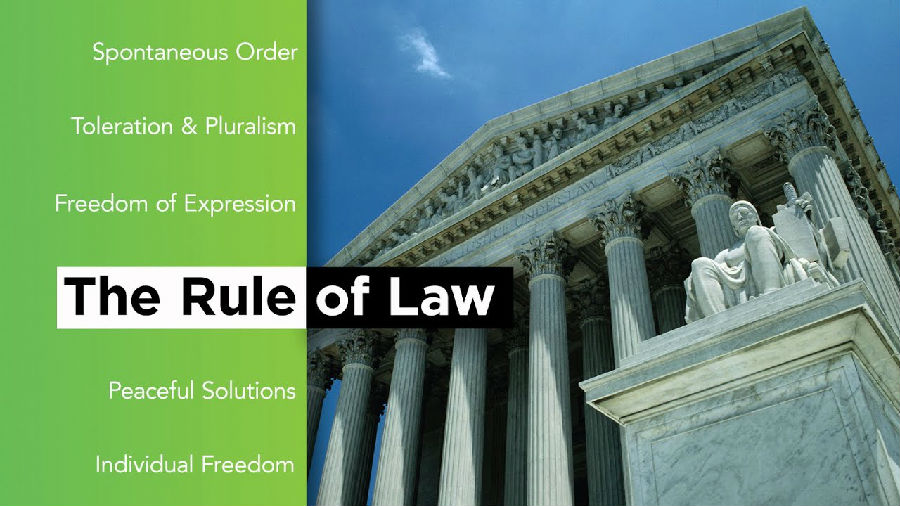What is the rule of law? Well, the rule of law has been defined in different ways.
什么是法治?法治有着不同的定义方式。
I think although the phrase was made popular in classical liberalism it actually has a pre-history.
我认为虽然法治一词在古典自由主义中很流行,但它其实是有前史的。
So Aristotle, the Greek philosopher, spoke about the difference between the rule of law and rule by a wise man.
所以希腊哲学家亚里士多德谈到了法治和智者治国的区别。
And rule of law for Aristotle had its, as its attraction, that it was seeking justice,
对亚里士多德来说,法治的吸引力在于,它追求正义,
and justice requires giving equal things to people who are equal in some respect
并且正义需要给予在某些方面平等的人同样的东西,
or giving the same punishments to those who've committed the same crimes.
或给予犯下同样罪行的人同样的惩罚。
And in that way, law preserves a kind of steadiness to the administration of justice
这样,法律保持了司法的稳定性
so that for Aristotle speaking of the rule of law without speaking also at justice wouldn't make any sense.
所以对亚里士多德来说,不讲正义就讲法治是没有意义的。
In fact, for the Greeks justice was a virtue, it was also something that could be described objectively in a city,
实际上,对希腊人而言,正义是一种美德,也是可以客观地被描述为一座城市的
but it was first and foremost a virtue in human beings.
但首先是人类的一种美德。
So, in that way the aim was to have law integrated into a human personality, to have law so imbue a person that he acted justly.
所以这样的目的是让法律融入一个人的人格,让法律如此渗透一个人,让他公正行事。
Or maybe it's actually the reverse that the law would reflect the justice of a wise man.
也可能恰恰相反,法律反映了智者的正义。
Actually, that's probably the better way to put it, the law would reflect the justice of a wise man.
其实这可能是更好的说法,法律反映了智者的正义。
Now, Aristotle wrote that it's ordinarily better to be ruled by law than by another human being
亚里士多德写道,通常被法律统治比被另一个人统治要好
because there are very few people who are really that wise, not to mention wise and concerned for your good.
因为很少有人能拥有这样的智慧,更不用说要为你着想的聪明人了。
I like to say to people, at least when you're young there is somebody who's wiser than you
我喜欢跟大家说,至少当你年轻的时候,有人比你聪明
and more concerned about your good than you are; that's your mother usually.
比你更关心你的利益,这个人通常是你妈妈。
But outside of that it's rare to find an instance where there's someone wise enough to really rule others,
但除此之外,很难找到一个足够聪明的人来真正统治其他人的例子,
much less a lot of people a whole society, so better to rule by law.
更不用说很多人,乃至整个社会,所以最好是依法治国。
And besides, if rule is by a group of people in a republic or what Aristotle called a polity or even in an aristocracy,
此外,他认为如果统治是由一群在共和国或者亚里士多德所说的政体中或者甚至是在一个贵族政体中的人制定,
but certainly in a republic or polity where many rule together,
但肯定是在一个由许多人共同统治的共和国或政体中,
and there can be a kind of wisdom there and there could be a good aim for that, he thought.
这里可能有一种智慧,也可能有一个很好的目标。
They can only rule by law; they can't assemble to deal with every single instance,
他们只能依法治国;他们不能共同处理每一个单独的实例,

but they can make laws for dealing with most cases most of the time. All of this supposed that the end of law really mattered.
但大部分情况中,他们可以制定法律来处理大多数情况。所有这一切都假设法律目的真的很重要。
It wasn't just the form of law, a form of words that's general and perspective, but what was the end that they sought,
它不仅仅是法律的形式,一种概括性和观点性的文字形式,而是他们所追求的法律目的,
and for the classical political philosophers the end was the common good.
对古典政治哲学家来说,法律目的是共同的利益。
All of this gets repeated and in a way ramped up by the medieval political philosophers,
所有这些都被中世纪的政治哲学家以某种方式重复着
particularly Thomas Aquinas, in his classic treatment of law for the medievals drawing not only on the Greek philosophers
尤其是托马斯·阿奎,他在他那本关于中世纪法律的经典著作中不仅借鉴了希腊哲学家的观点
but also on the tradition of the Hebrew scriptures and the importance of the law of God,
还借鉴了希伯来圣经的传统和上帝律法的重要性,
as given especially in the Ten Commandments, first and foremost in the Ten Commandments and then the other laws that followed from those.
尤其是在《十诫》中,首先是在《十诫》,然后是其他的律法。
Law really explains all order in the universe and all reason in the universe.
法律确实解释了宇宙中的所有秩序和宇宙中的所有理性。
Now, the classical liberal conception of law draws upon this sort of ancient classical tradition
古典自由主义的法律概念借鉴了古代古典传统,
and the medieval classical and Judeo Christian tradition, but it saw things a little differently.
以及中世纪古典和犹太基督教传统,但它看待事物的方式有点不同。
Here there became less of a concern for the end or rather the end
在这里,人们不再关心法律目的或者说,
was no longer defined as the common good understood as a shared life of virtue lived by the city, but rather the good of each individual.
法律目的不再被定义为公共利益,不再被理解为城市中共享的生活美德,而是每个人的利益。
On the supposition that what's good for each of us really varies from person to person and that, again,
假设对我们每个人有益的东西因人而异,
outside of that qualification of what happens when you're young, which is no small qualification
除了年轻时的那些限制,这些不是小限制,
because we're all born as infants and come into the world as infants.
因为我们出生时都是婴儿。
But leaving that aside, once we're mature we know what's good for ourselves better on the whole than anyone else could know it
但撇开这一点不谈,一旦我们成熟了,我们就会知道什么是对我们有好处的,
and we certainly care a lot more about our own good than most people do for us.
我们当然比大多数人更关心自己的利益。
Again, that's not quite true because when you're in love it might be the person
但这么说不是完全正确的,因为当你坠入爱河时,
with whom you're in love who cares more for you in a way than you do for yourself because you lose yourself in that other person.
你爱的那个人可能在某种程度上比你自己更关心你,因为你在另一个人身上迷失了自己。
But ordinarily to the classical liberals, classical liberals sort of put love in the background
但通常对古典自由主义者来说,古典自由主义者把爱放在背景中,
or rather I guess what they say is society isn't going to tell you how to love and whom to love.
或者我猜他们说的是社会不会告诉你如何去爱以及去爱谁。
So all things considered, the best judge of this is you.
所以从各方面来看,最好的法官就是你自己。
And that means there's a place for law, but law is now the rules which allow each of us to live out our own lives and pursue the good,
这意味着法律是存在的,但现在的法律是允许我们每个人过自己的生活和追求美好
pursue happiness in that phrase of John Locke adopted by Thomas Jefferson in the Declaration of Independence,
追求幸福的规则,就像约翰·洛克在《独立宣言》中所说的那样,
to pursue happiness as we understand it.
去追求幸福。
And so, the rule of law become those rules, not telling us how to live in the sense of what will make us happy,
因此,法治成为了规则,不是告诉我们怎样生活才能让我们快乐,
but how we can live together in such a way that we don't bump into each other too much
而是告诉我们如何才能以和睦的方式共同生活
and in fact that we maybe even sometimes help each other out on the way to our own happiness.
事实上,我们有时甚至会帮助彼此走出困境,走向自己的幸福。


